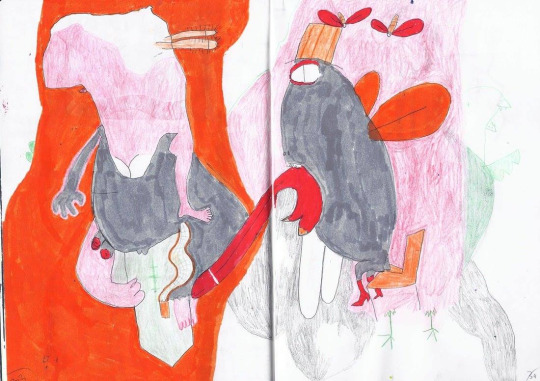
Drawing by Izzy Jackson
Cities, Life, and Art
In Interviews • # Halifax, Izzy Jackson, NSCAD, Sophie Wonfor, visual art
Sophie Wonfor and Izzy Jackson talk art.. school… art in school… cities, life, and art.
Sophie Wonfor just designed a new logo for the Arts Abstract! So sik! She is Bread in Alberta, just finished snacking in Halifax, now seeking weeknight dinner ideas in Montréal. She studied printmaking and a muesli-mix of critical studies classes for two years at NSCAD, but makes a lot of work in resin, glass and plant material. She is moving to Montréal to finish her degree in Art History and Studio Art at Concordia. “(Recognizing that I actually have a practice is relatively new for me.) The space I wake up in and the space I work in are just as much my practice as the things I do and make while I’m there. The way I set up these spaces is as much my practice as the occasional beam of window-light on my desk, the people who are present, the conversations we’re having, the houseplants around the room and the gardens outside. My work is from and about these environments: clipped, pruned, preserved, and arranged. Drawing is often the largest part of what I do, but there’s something about dipping hosta leaves in resin or arranging plant clippings that really fills me up. I hope to engage a conversation that acknowledges but diverges from the historically gendered use of plants, that looks into our inseparable relationship with them and does not represent them so much as employ their language.”
Izzy Jackson says: “I’ve always felt very attached to the past. And at the same time, I think about the future a lot. I think about what the present will look like for the future. So in my art I deal with tracing things. I have written over 100 diaries. I am quite obsessed with documentation, trying to give a good record of the now so that the future can look at something from the past. I am afraid of forgetting and of dying so I use art as a way of making something that can last…” Izzy asks a lot of questions with her art, such as what it means to love oneself, about the link between sexuality and communication, about her own sexual history and how it changed her. She also made paintings that were trying to find a ‘natural self’ through intuitive art and abstract painting. She is currently a student in the Foundation Year Programme, looking to return to studying the fine arts in September.
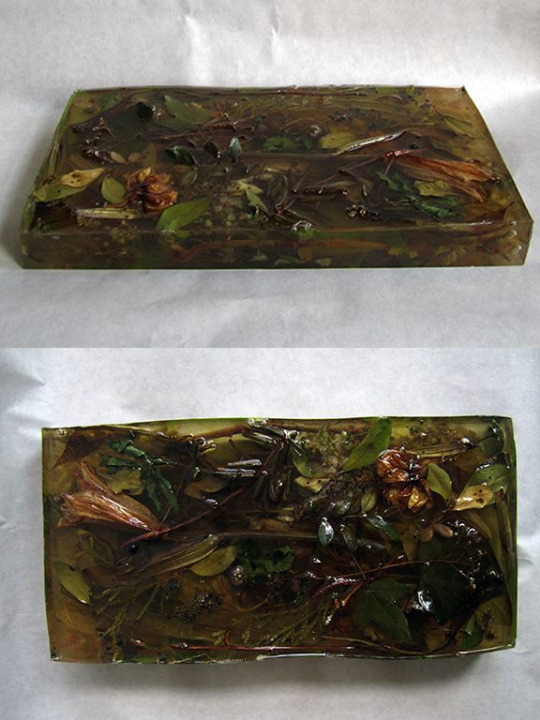
Why study art? By ‘study art’ i mean ‘why study art in university… why not study it in university…’?
Soph Wonf: I think all the reasons you should be encouraged to, are completely paralleled by why you don’t need to. Whether or not you want to study art in school, is so dependent on what you think you need and want to do. Art doesn’t really fit into a school so much as it happens between the structures of the school. The conversations that happen after or between classes are no less valuable than those that happen during class. Slightly outside of the structure of school is where a lot of students might feel the most comfortable to fully engage in their practice, or in conversation. I have definitely been there, but I also love being in school. Through NSCAD I found a community of likeminded people with similar motivations, with shared cares and concerns for art. They might have been harder to find outside of school, but surely not impossible. I’m hard pressed to believe you could spend even a semester at an arts university and not leave somehow changed, but how does that change compare to a semester spent studying or practicing art outside a university? I can’t imagine either being so much better or worse, as long as it’s where you want to be.
Izzy Jackson: My thoughts on this have evolved over the years. I started out, near the end of high school, wanting to have complete and total freedom. My high school, Etobicoke School of the Arts, gave me a taste for conceptual art that made me want only that. After that, I took a year off to work and make art on my own. It gave me lots of time to experiment but the freedom I had ended up stressing me out a lot. Since art is such a broad topic, it can be a bit overwhelming to try and practice on your own, with so much freedom.
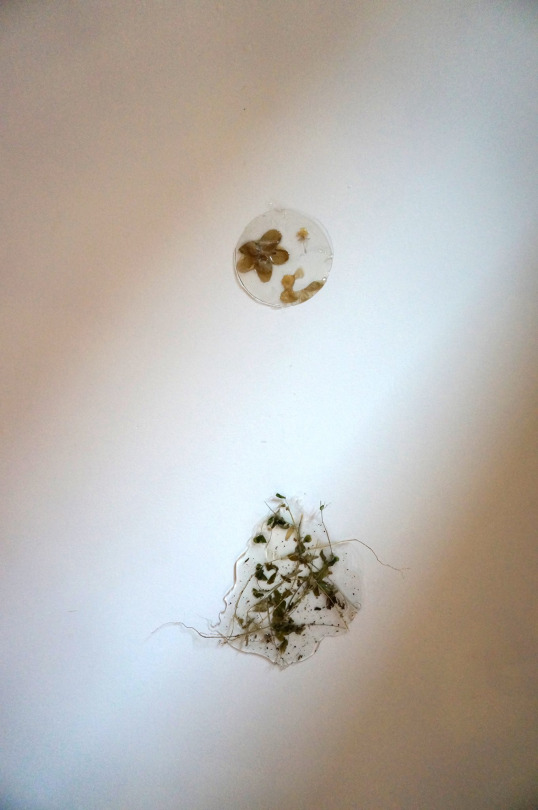
How has your degree changed your relation to your art practice?
Wonf: Being at NSCAD allowed me to actually understand that I do have a practice. In my second year my video professor asked us to “pay attention to what you pay attention to.” I think that kind of sums up what made it happen for me. Giving validity to the fact that I am paying attention, thinking, reading, recognizing ideas, and choosing to really work with some of those ideas has been huge. Where I previously had felt I wasn’t “legit enough” to even apply or submit work anywhere, being at school gave credence to my practice, allowing me to make a lot of work I really wanted to make and show. I also finally understood that I really can’t make art alone. Even if I do (and need to) spend a lot of time on my own, if I didn’t have people to talk to about what I’m thinking and doing, I wouldn’t actually get very far at all and my work wouldn’t be where it is. Collaborating with other people was new to me this year too, and turned out to be one of the best experiences I think I’ve ever had at NSCAD. It was so exciting to finally be able to seriously connect and create with other people, and I don’t think I knew how much I was missing that. (Kind of the complete opposite of Joni Mitchell’s sentiment in ‘Big Yellow Taxi’: I didn’t know what I didn’t have till I got it.)
Jackson: At the small arts course I took in Berlin, I was given a lot of freedom. This was really great for me at the time because I was able to explore whatever I wanted with feedback from my weird and smart mentors. I explored all the things I wanted to before but didn’t have the space or motivation to before, like animation and installation. I met really great people there who all had different interests. The woman I shared my studio with, Harriet, made realistic drawings and paintings. Realism was something I had lost my respect for when I was introduced to conceptual and abstract art in high school. I thought “what is the point of recreating what already exists”. But as me and Harriet became closer, I felt things new when I saw her drawings. I think having a close friendship with her made me open up to realism. Now I have an interest in drawing what I see, especially the people I know. It feels very different from drawing from my head. So yeah, I think art education can open you up to new ideas and techniques. I think the relationships you make are the ones you can learn the most from. I haven’t gone to a normal art university yet so I am still not sure if it is for me. But I know that even if I don’t like the school, I will learn at least something from it. I want to go to Concordia University next year because they have so many different facilities where I can learn they ways of new mediums like print, fibre arts, ceramics, and much more. Instead of exploring them on my own like I did in high school and Berlin, I will have the guidance of teachers who have a lot of practice in the specific medium. I will have to go by that teacher’s specific opinion and technique but that will give me a strong foundation for it which will open up the possibilities for what I could do with it next. I will leave school knowing the “right” way of these mediums and will then be free to do whatever I want with them. I want to leave school with as much knowledge of what the “right” way to make art is so that I can then choose to follow that or not. The benefit of arts school is that it opens you up to possibilities of art.

What is the critical art community like in Halifax? Do you feel you are pushed here? Why or why not?
Wonf: In my experience Halifax has been far more encouraging than it has been critical. Criticism, however, definitely exists. I have found it mostly surfaces within conversations that are happening between friends, so it is always within an atmosphere of respect and support. To the same degree, I think it is the people I know that have pushed my practice the most. Halifax makes it possible to actually meet, engage and even become friends with a person whose art/music/skills you admire, which seems pretty distinctly special to me.
Any words on what the larger creative/art community has going for it here?
Wonf: Halifax feels like it might be the most transient Canadian city – people are constantly coming and going – while there is also a sense of something solid, and established. Not necessarily permanent so much as established. That duality seems to have created a nice little crux where Halifax’s creative community has found its niche.
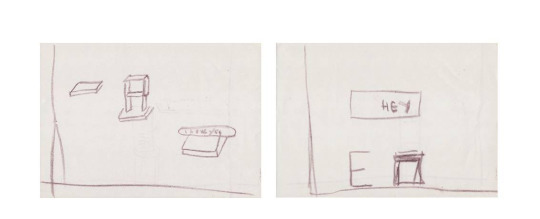
What led you to decide to leave / change up your scene?
Wonf: I had a really challenging semester (it seems most people do in their third year) and was feeling overwhelmed and like I couldn’t really tackle the questions that were filling up my head (which have been the focus of this interview, haha). I think the only reason I didn’t completely withdraw from classes was because of how much I cared about finishing them. To me, it would have been symbolic of me giving up on art and that wasn’t what was happening. I wrote one of my classes a break-up letter (addressed to fine-art printmaking): there were a dozen lithograph prints of my handwritten letter on the table, and during the crit everyone was really taken aback because they thought I was abandoning art. Having someone say out loud “I thought you were quitting art forever,” allowed me to realize that I was just taking a break from making art the way I had been. I needed to take time off, spend some time picking through my own head before I tried to finish my degree. In doing so it felt more and and more like the right time to make a move, and this was a move I’d been thinking about making for a while. Aside from the allure of change, of trying to start up in a different city, a different community, I’m really excited to be closer to my sisters, Harley/my partner and halfway-across-the-country-closer to my parents.
Jackson: By the end of the course in Berlin, I felt the need for structure so I decided to come to King’s for the Foundation Year Programme to learn about philosophy and history. I have found that the things I originally rejected are now things that I crave. Freedom became scary and is now boring so this year, while taking the Foundation Year Programme at King’s, I have been exploring the realm of realism. I enjoy the slowness and concentration that it forces me into. […] For me, learning philosophy has helped me be more creative and more artistic with the way I analyze and talk about things. It helps me look at things in a less literal way.
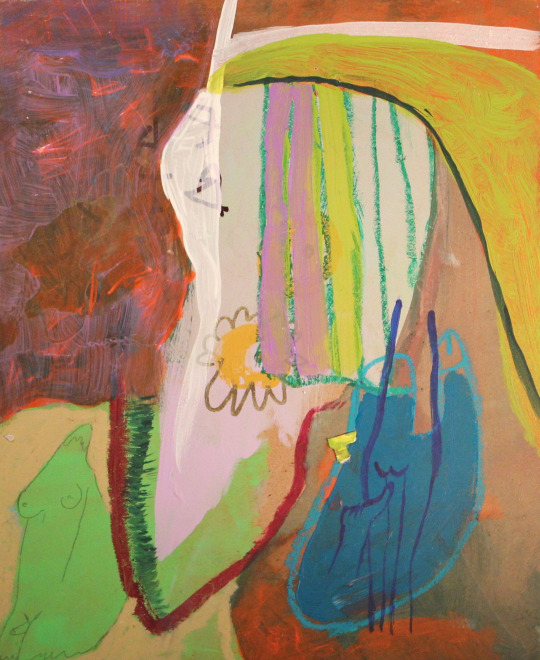
What in particular do you feel NSCAD is doing wrong? Right?
Wonf: There is so much on the table for this school right now. Inseparable as it is from the arts in this province, and the associated budget cuts, the school is clearly cornered by finances. It’s tragic and frustrating to have felt the school feel more like a business than an educational center, and to feel at times like there is a too great divide between the university’s identity and the people and events and art within it. The latter I have felt comes out of a big emphasis on the school’s history, ie: the Golden Years and its place in conceptual art of the 1970s, which is totally important, but it’s not all the school is or has going for it. Infinite points for: keeping itself alive, bringing so many amazing people together, for being a space people feel they can pursue (or at least try) their ideas further than they might otherwise, for being a space with great facilities and a really nice view (and now there’s even Art Bar and the Khyber in the same building). Not to mention having The Anna Leonowens gallery built into the school gives the opportunity to students to have a solo exhibition before they graduate. That is so important. NSCAD has had a huge impact on my life, and I’m pretty sure I’m not the only one. (Maybe if I wasn’t so ready to go, I’d have stayed.)
What is NSCAD arts community for you?
Wonf: There’s a sense of solidarity and respect that I think allows a lot of young artists to gain confidence to commit to their pursuits, myself included. Running into your peers and professors at the grocery store is somehow a reminder that what you’re doing is actually sane, viable and important. It’s almost harder to avoid the community than it is to recognize you’re a part of it and find your place within it. I’ve met some of the most important people in my life here and to me those relationships are the most special thing.
~
~